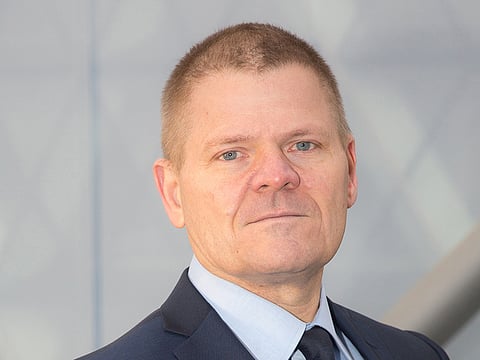ONEm offers new business model for mobile operators
It facilitates old voice and SMS to deliver without internet or smartphone

Dubai: When telecom operators are losing revenues from voice and SMS due to the growth of OTT (over-the-top) players like WhatsApp, Skype and others, a UK-based technology company — ONEm Communications — presents a huge opportunity for operators to transform these two services.
ONEm creates a way that a mobile operator can play a direct role in providing services and content where they get direct benefits and no longer will they be operating as a “Dumb Pipe”.
The “Dumb Pipe” context exists because of the OTT model where internet based companies benefit from telecom operators’ infrastructure and gain no direct benefit from the service being deployed on their network.
Christopher Richardson, CEO of ONEm Communications, told Gulf News that his company works with mobile operators to provide their mobile users with internet-style services through SMS and voice without the need for internet or a smartphone in different languages.
He has flipped the ‘OTT’ acronym around and is promoting a ‘TTO’ (through the operator) strategy.
“We have created a way for SMS to be truly interactive by integrating both voice and messaging into an interactive engine,” he said.
Richardson dismissed scepticism around the future of voice and SMS services, and said that they remain the ideal way to “connect people” and giving operators the opportunity to monetise their existing assets.
“Our platform transforms SMS and voice into interactive services. We are in discussions with regional telecom operators. Reuters, Bloomberg and Al Jazeera have tied up with us and a Dubai university is to come on-board shortly,” he said.
For example, telecom operators in the UAE are offering basic services like *170# on etisalat and *135# on du network.
“We are in talks with regional telecom operators, including etisalat and du,” Richardson said.
Customers need to subscribe to the ONEm platform via a telecom operator and the mobile operator designates the routing for ONEm via a shortcode or dedicated prefix.
“Our platform possesses a scalability to be able to handle billions of transactions,” he said.
A user can send an SMS and set up a call, group call or group chat. News providers can push rich content over the platform via voice or SMS. But to access videos a user needs to have data, he said.
“The operators are not able to do this now as it will cost them money. We do this on a global basis and operators just have to connect to our platform. The operator can charge a monthly subscription and you will be able to talk with another mobile number in another country unlimitedly. Businesses can use these services, even for group messaging,” he said.
Mobile operators can now offer a way to search, filter and display content and simplify people’s ability to get information in a simple way.
ONEm offers over 100 services, including podcasts, news updates, health information and educational tools, as part of the package.
Richardson said that still voice and SMS can do many things a data cannot do.
For example, he said that there are 14 million brands globally and how do you find them. You need to go to Google search and find them or download the company app.
On Onem platform just type *company name and send an SMS, you will get all the details about the company. Users don’t need to download an app and don’t need the internet.
“We have 10 mobile operators that have signed up and expect to have 30 mobile operators by end of the year. We will have major announcements with brands and will be announced at Mobile World Congress, Barcelona, in February. We will have six million active subscribers by end of the year, from the current one million,” he said.
ONEm has four data centers — two in the UK, one in the US and one in Hong Kong.
“Next will be India and Africa. We are also looking at setting up one in Dubai,” Richardson said.
Sign up for the Daily Briefing
Get the latest news and updates straight to your inbox



